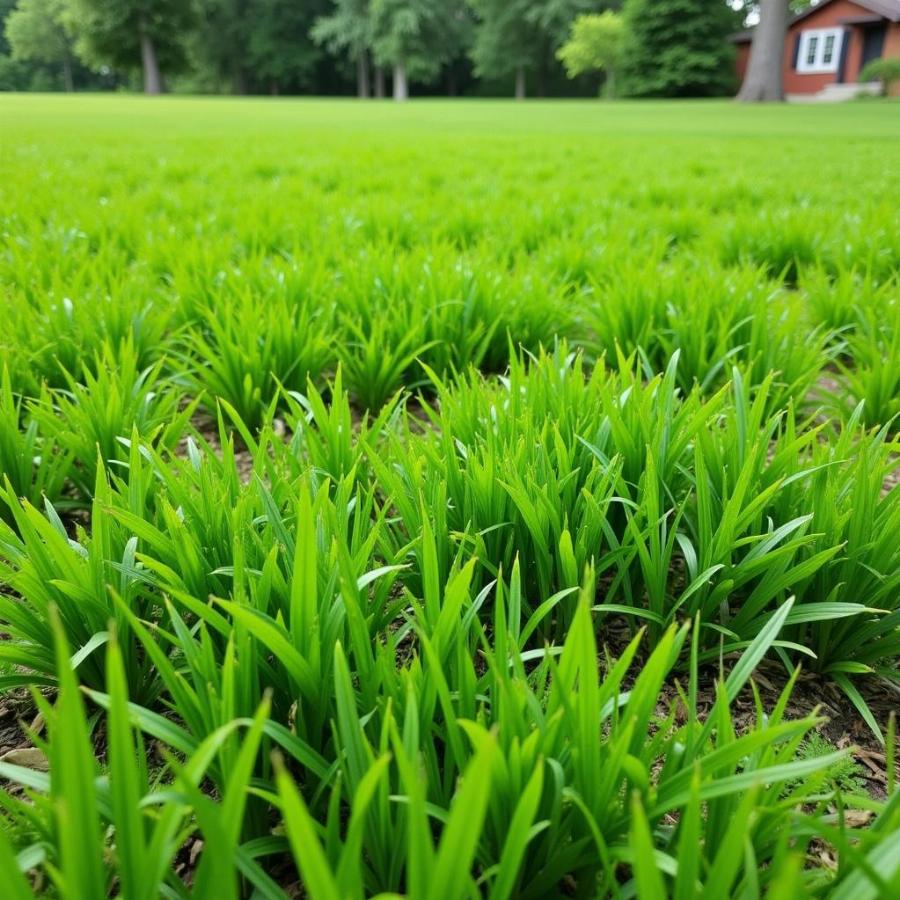Dealing with unsightly dog pee stains in your lush green lawn is a common challenge for dog owners. This comprehensive guide will explore the causes of these frustrating patches and offer practical solutions for preventing and treating dog pee stains in grass, helping you maintain a healthy and vibrant lawn while catering to your furry friend’s needs.
Understanding Why Dog Urine Stains Grass
Why does dog urine cause those brown spots? The high nitrogen content in dog urine acts as a fertilizer, initially promoting rapid growth, which creates a darker green patch. However, in higher concentrations, the nitrogen becomes toxic, scorching the grass and leaving behind a brown, dead patch. The salts in dog urine also contribute to dehydration, further damaging the grass.
Preventing Dog Pee Stains: Proactive Measures
Taking proactive steps can significantly minimize or even eliminate dog pee stains. One effective strategy is to train your dog to urinate in a designated area of your yard, perhaps one covered with gravel or mulch. This confines the damage to a specific spot and protects your main lawn area. Another approach is to dilute the urine’s nitrogen concentration by increasing your dog’s water intake. Encourage drinking by providing fresh, clean water throughout the day, perhaps even adding a little low-sodium broth to make it more enticing. You can also consider a dog bed removable cover to keep your dog’s space clean and fresh.
Treating Existing Dog Pee Stains: Restoring Your Lawn’s Beauty
If you’re already facing the consequences of dog urine, don’t despair! Several methods can help restore your lawn’s health. Firstly, flush the affected area with plenty of water immediately after your dog urinates. This helps dilute the nitrogen and salts, minimizing the damage. For established stains, consider applying a soil neutralizer specifically formulated to combat the effects of pet urine. These products help balance the pH levels in the soil and encourage grass regrowth. Are you concerned about your plants as well? Learn more about how dog urine affects them in our article on does dog urine kill plants.
Dietary Adjustments: A Holistic Approach
While no magical dog food completely eliminates nitrogen in urine, certain dietary adjustments can make a difference. Consulting with your veterinarian about a balanced diet that’s appropriate for your dog’s breed, age, and activity level can be beneficial. They might recommend a diet lower in protein or suggest supplements designed to reduce the nitrogen concentration in urine. If you are concerned about your dog vomiting on your rugs, read our article on how to clean dog vomit from rug.
Choosing Dog-Friendly Grass: Long-Term Solutions
If you’re planning a new lawn or considering reseeding, opt for grass varieties more resistant to dog urine. Fescue and ryegrass blends are known for their durability and tolerance. A clover lawn for dogs might be an alternative, as it is more resistant to urine burns and requires less maintenance. Ensure your lawn is well-maintained through regular watering, fertilization, and aeration. A healthy lawn is more resilient to damage in general, including that caused by dog urine. Remember, maintaining a healthy lawn also requires responsible weed control. Check out our guide on dog friendly weed control for safe and effective options.
How Can I Encourage My Dog to Drink More Water?
Providing multiple water sources around the house and yard, adding ice cubes or flavoring to the water, and offering wet food can encourage your dog to drink more water.
 Dog-Friendly Grass Resistant to Urine
Dog-Friendly Grass Resistant to Urine
Conclusion
Dealing with dog pee stains in grass requires a multifaceted approach. By combining preventative measures, effective treatments, and a little bit of patience, you can enjoy a healthy, green lawn while providing a comfortable space for your beloved canine companion. Remember, addressing the issue proactively and consistently is key to achieving long-term success.
FAQ
- Will dog urine eventually kill my grass? Yes, repeated exposure to concentrated dog urine can kill grass.
- Are female dog urine stains worse than male dog urine stains? Generally, yes, due to the concentrated nature of female dog urine.
- Can I use baking soda to neutralize dog urine stains? While some people use baking soda, it’s not always effective and can even harm your lawn if used incorrectly.
- How often should I water my lawn to prevent dog pee stains? Watering deeply and less frequently is generally better than shallow, frequent watering.
- Are there specific grass seed mixes designed for dog owners? Yes, some grass seed mixes are marketed as being more resistant to dog urine.
- Is it harmful for my dog to ingest lawn care products used to treat urine stains? Some products can be harmful if ingested, so always choose pet-safe options and follow instructions carefully.
- Will watering my lawn after my dog urinates completely prevent stains? While watering helps, it’s not a foolproof solution, especially with frequent urination in the same spot.
Further Reading
For more helpful tips on dog care and lawn maintenance, check out our articles on dog-friendly landscaping and choosing the right grass for your climate.
Beaut Dogs is your go-to resource for all things dog-related, from breed information to expert advice on care and training. For personalized guidance on dealing with dog pee stains and other lawn care challenges, contact us at [email protected]. Beaut Dogs (https://beautdogs.com) is committed to helping you create a happy and healthy environment for both you and your furry friend.